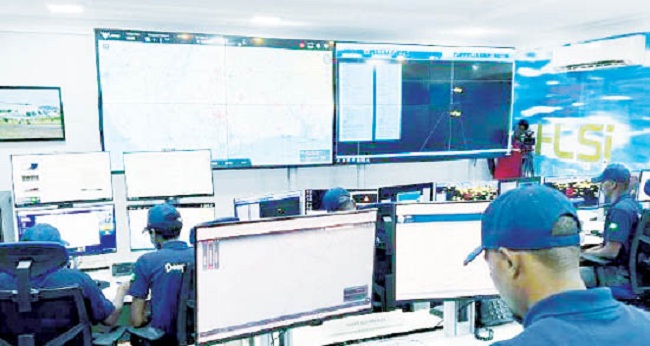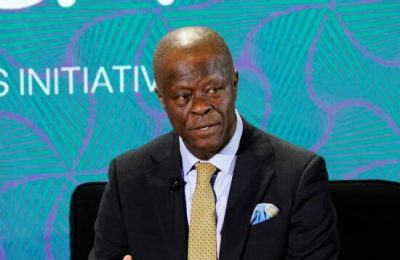The Nigerian maritime sector has different surveillance systems that monitor activities in order to checkmate illegal operations and enhance security. In this report, TOLA ADENUBI looks at why the two major platforms, C4i and Falcon Eye, need to deepen collaboration.
With the level of insecurity in the Gulf of Guinea (GoG) and the Nigerian waters in the recent past, the need to monitor activities within the maritime domain led to the launch of satellite surveillance systems by the Nigerian Maritime Administration and Safety Agency (NIMASA) and the Nigerian Navy.
While the sector has benefitted immensely from the launch of the two satellite surveillance systems, the absence of collaboration between these two surveillance systems has led to gaps in the recent past and calls for deeper integration.

NIMASA surveillance system
The surveillance system being operated by NIMASA is called the NIMASA Command Control Computer Communication Information System, otherwise referred to as C4i System.

The NIMASA C4i centre, with manpower composition from all security services in Nigeria, is the central nerve for the Deep Blue Project with the use of modern technology to achieve security information sharing real time amongst all the Deep Blue assets which include special mission vessels, helicopters, aircraft, fast intervention vessels and specially purpose-built armoured vehicles.

The C4i is the central nerve serving as the base for situational intelligence gathering, synchronising situational security reports on land, air and the maritime domain in Nigeria and analysing the same in real time for the Deep Blue Project.
Navy surveillance system
The Nigerian Navy surveillance system is called the Falcon Eye System. The Falcon Eye system is a state-of-the-art surveillance facility that incorporates various sensors located along the nation’s enormous coastline, such as radars, long range electro optic systems with thermal or night vision capability, automatic identification system receivers, weather stations and marine very high frequency (VHF) radios for communication.
The integration of these sensors into the Falcon Eye system generates a real-time situational awareness of the activities of vessels in Nigerian maritime domain and some selected parts in the Gulf of Guinea.
Call for collaboration
There have been calls in the recent past for the two surveillance system to collaborate and not work at cross-purposes, with the Minister of State for Defence, Honourable Bello Matawalle, highlighting this recently during his tour of the C4i System in Lagos.
During his visit, Matawalle stated that the Federal Government is committed to deepening the integration of the operations of the NIMASA C4i system and the Falcon Eye system for optimal security of the Nigerian maritime space.
Matawalle said Nigeria will benefit much more if all agencies of government can synergise seamlessly and improve information sharing among one another for the benefit of the country. He called for enhanced synergy between the Nigerian Navy and NIMASA, especially with the C4i system and the Falcon Eye, which are platforms that will massively complement each other.
He said, “I am delighted at what I have seen at NIMASA C4i centre and our goal is to see how it can be integrated with the Falcon Eye of the Nigeria Navy because all we need is to secure our maritime domain, therefore, the Navy and NIMASA must work together to create the desired maritime environment for a prosperous maritime economy.
“We want them to work together and to be integrated so that they will be communicating with each other. If the Falcon Eye and C4i are communicating effectively, our maritime space will be devoid of security challenges and this will boost the courage of both local and foreign investors in the sector.”
In his remarks, Director-General of NIMASA, Dr Dayo Mobereola, expressed delight at the minister’s visit, stating that effective synchronisation of the NIMASA C4i and the Falcon Eye of the Nigerian Navy will add to the strides of the Federal Government in reaping the benefits of the blue economy.
The NIMASA DG, who was represented by the agency’s Executive Director, Operations, Engr. Fatai Adeyemi, said improved information sharing between NIMASA and Navy will enhance capability of the security agencies in curbing maritime crimes in Nigerian waters.
“We are glad to receive the Minister of State, Defence at NIMASA C4i today. This is simply a show of commitment of this administration to effective collaboration amongst all organs of government to achieve a common goal and in this instance, maritime security.
“You heard what the minister said about integrating the C4i with the Falcon Eye. I believe that is a step in the right direction. And I am sure by the time that this is done, it is going to give us a more secure marine environment,” he said.
‘Working in isolation creates security lapses, spurs rivalry’
The C4i and the Falcon Eye have mostly operated independent of each other since inception, with both systems sometimes not sharing information with each other, which often leads to security gaps within the nation’s maritime space.
“It is important that the Falcon Eye and the C4i talk to each other every minute. If this is happening, then Nigeria’s maritime space will be better secure. The era where both systems operate independently of each other is not good for the country because this often leads to hoarding of information from each other.
“When both systems are not in sync, they tend to want to start competing with each other and this is not good for our maritime space. We need both systems not to see each other as rivals but as one body working for the same purpose.
“Criminals are always out to exploit gaps in security operations to carry out their nefarious activities. When both systems hoard intelligence because they want to outwit each other, then it gives room for criminals to perpetrate their evil deeds.
“If both surveillance systems start communicating, the improvement in maritime security that Nigeria has recorded in recent past will further increase and the nation will be the beneficiary of such collaboration. It will even cost the nation less to monitor her maritime space when both systems are communicating,” a maritime security expert and former Senior Special Assistant on Maritime Affairs to the Presidency, Mr Gbenga Leke Oyewole, told the Nigerian Tribune.
Read Also: Ex-President Jonathan eulogises Obaseki on human capital development








